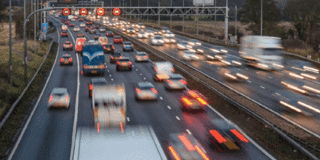A tougher driving test, greater use of real-time information systems and better co-ordination between road management authorities offer affordable methods by which to curb road congestion, say MPs.
Out of the Jam: reducing congestion on our roads is the report of an inquiry undertaken by the Transport Committee that examined options for curbing congestion without road building or road pricing.
Launching the report today, committee chair Louise Ellman said: "Congestion costs the economy billions of pounds each year. Improving the way we manage road space so that the network runs more smoothly is vital to the prosperity of the nation. Pursuing this challenge should form a key plank of central government transport policy.
“The Department for Transport cannot simply devolve all responsibility for managing the road network to individual Highway Authorities. These organisations have a key role and duty for managing their local networks, but the DfT should actively support them in working together closely to fulfill that duty.
"More must be done to improve driver behaviour and road safety through better understanding of and adherence to the Highway Code.
"Ministers must also clarify who is responsible for warning road users about impending congestion and work with the transport industry and authorities to increase the availability of such information to drivers through greater use of existing, successful 'intelligent traffic management' systems across local authority boundaries.
"Much more can also be done to improve co-ordination between highway authorities and organisations undertaking street works to ensure local authorities use the best available technology to co-ordinate their road or traffic management activities with other highways authorities.
"We support the Highways Agency in its joint initiative with the Police and the Home Office to speed up the time taken to clear major roads following accidents. But it's crucial that recommendations made in May this year by the Agency, to address regional variations around this issue, are taken forward more urgently than December 2012."
The Transport Committee sets out a series of recommendations to government about how it could curb congestion and get more out of the existing road network:
• Consider options for a free Highway Code 'App', and other ways in which new communication media could be utilised to disseminate the Highway Code.
• Send a clear leaflet to all drivers, when they apply for or renew a tax disk or a driving licence - to highlight recent changes to the Highway Code and existing sources of detailed travel information. This leaflet could also remind drivers to use the 'traffic programme' (TP) button - available in 80% of vehicles but used by less than 25 % of drivers - to keep track of accurate, up-to-date travel information.
• Monitor cost and safety issues of the 'managed motorway' scheme, especially on road stretches where junctions are so widely spaced the use of the hard shoulder by motorists could prevent emergency vehicles from reaching accidents.
• Require all highway authorities to publish traffic management performance measurements, no later than the beginning of 2013.
• Implement fully Part 6 of the Traffic Management Act 2004 by 2013 so that local authorities can deal more effectively with moving traffic offences.
• Publish early next year a detailed assessment of traffic flow on the M4 in the year since the bus lane was scrapped. The Committee also call for the lane to be reinstated if that evidence shows the bus lane has contributed to faster traffic movement-taking account of all travellers.
• Work more closely with highway authorities to identify the latest forms of intelligent traffic management systems and renew its funding for the so- called 'ITS Toolkit', to ensure highway authorities choose the most up-to-date, appropriate systems and can share best practice.
• Develop a strategy - reflecting best practice - for the delivery of real-time travel information to motorists that identifies clearly what is to be provided by local authorities or the Highways Agency and what by the private sector.
• Commission an independent evaluation of the London and Kent permitting schemes for highway authority and utility street works; also put in place arrangements to monitor the uptake of other permit schemes and the variations between local authorities' approaches.
• Monitor the London lane rental scheme where utility companies pay to close road space for street works, and assess its value as a method for tackling congestion caused by these activities.





















Login to comment
Comments
No comments have been made yet.